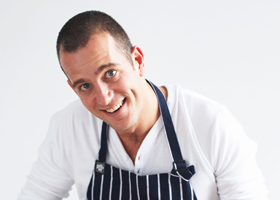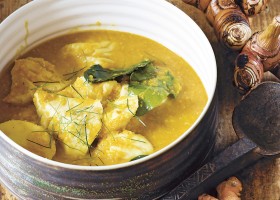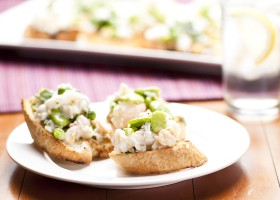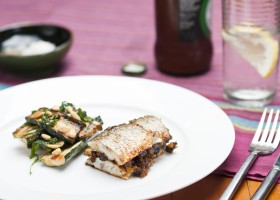Ingredients
- 2 brown onions, finely diced
- 4 garlic cloves, minced
- 2 bay leaves
- 1 Tbsp extra virgin olive oil
- 700g Kinkawooka mussels
- 1 cup dry vermouth
- 16 Spencer Gulf King prawns, peeled
- 300g Hiramasa kingfish, diced
- 200g Tasmanian salmon, diced
- 2 ripe tomatoes, diced
- salt and pepper
- basil leaves and pesto, to serve
Sustainable seafood stew
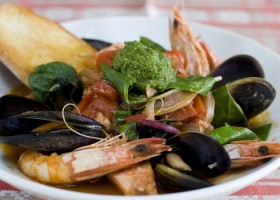
Few parts of our food chain are in direr straits than our oceans. Worldwide fishing levels have experienced a 500% increase since the 1960’s, and while this reflects a growing world population it is simply not sustainable.
Along South Australia’s Eyre Peninsula and throughout Tasmania you’ll find a range of fish farms, from salmon and ocean trout, to kingfish, snapper, mussels, scallops and tuna. Hatchlings are produced in land-based facilities that are then released into ocean pens. This enables a continuity of supply to market without adding to the pressures on wild fish stocks.
Currently the feed for these farmed fish is made from trawled supplies of wild sardines – a species under no threat – but exciting developments are taking place at Australian universities to create plant-based feeds that would enable aquaculture to finally close the life and production cycles of seafood.
Method
Sauté the onion, garlic and bay leaves in olive oil in a large saucepan over a medium heat for 5 minutes, until softened, then add the mussels and cook for 2 minutes, until they open.
Pour in the vermouth, simmer briefly, then add the prawns, kingfish, salmon and tomatoes and cook fro 4 minutes. Season with salt and pepper then serve with basil and pesto.
Tips and Tricks
Tomatoes cope well with freezing and can be stored in a labelled re-sealable plastic bag in your freezer. They can be thawed fully on your counter-top or thrown straight into your dish fully frozen.
Pop basil stems into a cup of water, like a bouquet of flowers, and store in your fridge, covered with a plastic bag to prevent dehydration.


